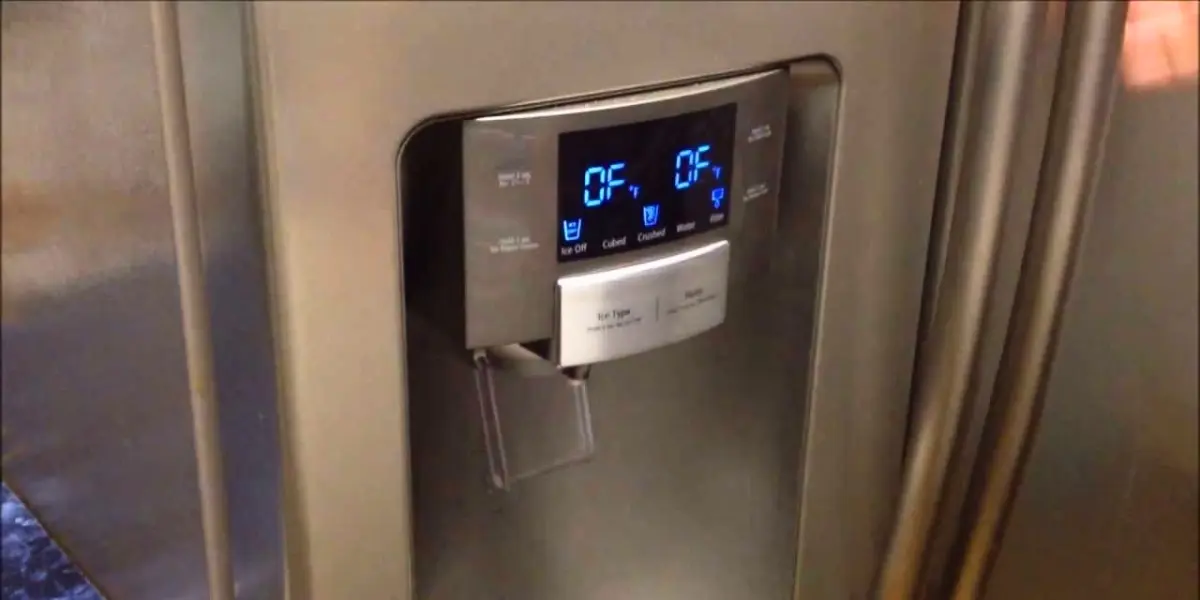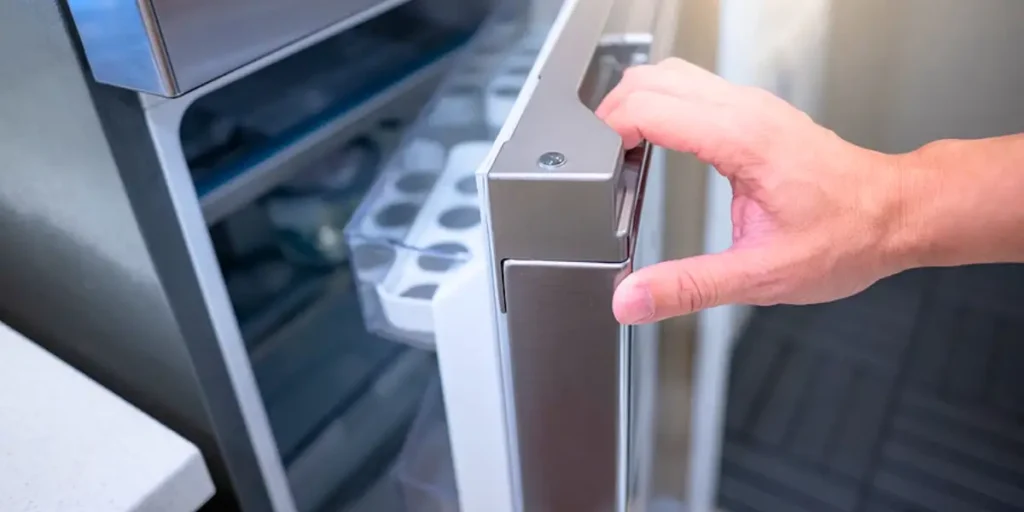Wondering how to turn off fridge without unplugging it?
It’s a common dilemma for those seeking to save energy. Luckily, there are effective methods. That doesn’t involve yanking the cord.
Here, we’ll explore practical steps and power-saving techniques. You can achieve this without compromising the freshness of your perishables.
Let’s dive in and uncover the secrets of hassle-free power management!

How to Turn Off Fridge Without Unplugging
If you want to turn off the fridge without unplugging it, follow these simple steps.
Locate the Power Button
Modern refrigerators often come with a power button. That allows you to turn the fridge on and off without unplugging it.
This button is usually located on the control panel. Either on the inside or outside of the fridge.
Some fridges may also have a dedicated “Eco Mode” or “Vacation Mode”. That helps save energy. You need to keep the appliance running at a minimal cooling level.
Activating Eco Mode or Vacation Mode
If your fridge has an “Eco Mode” or “Vacation Mode,” simply press the corresponding button.
This will reduce the cooling power. It also saves energy while the fridge remains powered on.
In “Eco Mode,” the fridge may still maintain a minimal cooling level. That keeps your perishables fresh while using less electricity.
Adjust Temperature Settings

Another option is to manually adjust the temperature to a warmer setting.
Most refrigerators have a temperature control knob or digital display. That allows you to increase the temperature.
By setting the fridge to a higher temperature, it will run less frequently.
As a result, it consumes less power. But keeping your food at a safe temperature.
Opening the Door Infrequently
Limiting the frequency of opening the fridge door can also reduce energy consumption. Every time you open the door, cold air escapes.
So the fridge needs to work harder to maintain the desired temperature.
Consider taking out everything you need in one go. Then keep the door closed as much as possible. It also reduces energy costs.
Common Mistakes to Avoid
Maximum people make mistakes while turning off their fridges.
Here is a list of common mistakes. That you should avoid during turn off the fridge.
Neglecting to Use Eco Mode or Power Button
One common mistake is not utilizing the eco mode or power button feature. Yet it is available on many modern fridges.
These options allow you to temporarily halt the cooling process without unplugging it.
By overlooking this simple solution, you might be missing out on an easy way. That conserves energy while maintaining the functionality of your fridge.
Failing to Adjust Temperature Settings
If your fridge lacks an eco mode, adjusting the temperature settings is a viable alternative.
However, a mistake often made is setting the temperature too high or too low.
When turning off the fridge temporarily, set it to a moderate temperature. That prevents food spoilage. It ensures it stays fresh when you turn it back on.
Overlooking Cleaning and Maintenance

Ignoring regular cleaning and maintenance can lead to inefficiencies and malfunctions. Dust and debris can accumulate on the condenser coils. That makes the fridge work harder.
So it consumes more energy. Make sure to clean the coils regularly. Check for any worn-out parts that might need replacement.
Not Planning for Extended Non-Use
If you’re turning off the fridge for an extended period, preparing is a must. Improper planning can lead to unpleasant odors and mold growth.
First, remove all perishables, and empty the fridge. Then leave the door slightly ajar to prevent moisture buildup.
Also, tape the power cord securely to the back of the fridge. It helps to avoid any damage.
Using Incorrect Techniques
Performing maintenance or troubleshooting tasks without proper knowledge is risky.
Avoid using sharp objects to defrost the freezer. Because they may damage the appliance.
Instead, use a gentle defrosting method. Or seek professional assistance for complex issues.
Turning Off the Fridge Too Frequently
Frequently turning off the fridge can impact its overall lifespan and efficiency. The cooling system functions optimally and operates continuously.
Avoid making it a habit to turn off the fridge regularly. Because it may cause additional wear and tear on the appliance. To save energy use eco mode.
Not Considering Safety Precautions
Safety should always be a priority when dealing with electrical appliances. Before performing any maintenance turning off the fridge
Ensure that your hands are dry, and you’re standing on a dry surface.
Never attempt to work on the fridge while it’s still plugged in. If you’re unsure about any task, seek professional help.
Ignoring Energy-Saving
Turning off the fridge without unplugging is useful for specific situations. Don’t overlook energy-saving practices during regular use.
Keep the fridge moderately full, check door seals, and position. Place it away from heat sources to improve its energy efficiency.
Rushing the Process and Skipping Steps
Taking shortcuts or rushing through the process of turning off the fridge can lead to mistakes.
Be patient and follow each step carefully. That ensures a smooth and successful procedure without any potential damages.
Not Monitoring the Fridge
If you turn off the fridge temporarily don’t forget to monitor the temperature regularly. Ensure it remains within safe limits. It is important to prevent food spoilage.
By being mindful of these common mistakes, you can successfully turn off your fridge without unplugging it.
Always follow the proper procedures and safety precautions to achieve the best results.
Safety Precautions When Turning Off the Fridge
When you turn off the fridge without unplugging it, safety should be a top priority. Follow these crucial precautions to avoid accidents and ensure a smooth process:
Dry Hands and Surface
Before handling the fridge’s power button or settings, make sure your hands are dry.
Make sure that the surface around the fridge is dry. It minimizes the risk of electrical shock.
Disconnect Power Source
If you need to perform any maintenance tasks. That requires touching internal components. Such as cleaning or defrosting, always disconnect the power source first.
Unplug the fridge from the electrical outlet. It eliminates any possibility of electric shock.
Avoid Sharp Objects
When defrosting the freezer avoid using sharp objects like knives or metal utensils. These items can damage the fridge’s interior.
It can pose a safety hazard. Use a plastic scraper or a soft cloth to gently remove the ice instead.
Properly Store Perishables
If you plan to turn off the fridge for an extended period, remove all perishable items. Then store them in a cool and safe place.
Ensure that no food items are left inside the fridge. It will prevent spoilage and potential health risks.
Leave the Door Slightly Ajar

When turning off the fridge for an extended period, leave the door slightly ajar. This allows for air circulation.
It prevents mold growth and unpleasant odors. However, ensure that the door is not fully open. Because it may strain the hinges.
Secure the Power Cord
If you need to store the fridge, secure the power cord to the back. You can use tape or a cord organizer.
This prevents the cord from getting entangled or damaged during storage.
Regularly Check the Fridge
If you’re turning off the fridge temporarily, periodically check the temperature. Make sure it remains safe for your food items.
Avoid leaving the fridge unattended for an extended period. Regular monitoring is a must to avoid unwanted damage.
By following these safety precautions, you can confidently turn off your fridge. It ensures a safe and successful process.
Always prioritize safety to protect yourself and your appliance.
FAQs
Will turning off the fridge affect its lifespan?
Yes, frequently turning off the fridge can affect its lifespan. The cooling system works optimally when it operates continuously.
Frequent on-off cycles may cause additional wear and tear. That leads to potential issues in the long run.
Can I turn off the fridge for an extended period?
It’s not recommended to turn off the fridge for an extended period. Especially if it contains perishable items.
Without power, food may spoil. That leads to health hazards and unpleasant odors.
How can I save energy when using the fridge regularly?
To save energy, ensure the door seals are tight and free from debris.
Additionally, clean the coils and place the fridge away from heat sources.
What if my fridge doesn’t have a power button or Eco Mode?
If your fridge lacks a power button or Eco Mode, you can still minimize power consumption.
Adjusting the temperature settings and limiting door openings. For more significant energy savings, consider upgrading to a newer model.
How can I prepare my fridge for a longer period of non-use?
If you need to store your fridge for an extended period, first empty it and clean it thoroughly.
Then, prop the door open slightly to allow for air circulation. It prevents mold growth. Unplug the fridge, and use tape to secure the power cord.
Conclusion
How to turn off fridge without unplugging is everyone’s concern. Luckily it is possible with the help of a power button, Eco Mode, or temperature adjustments.
By following the steps and tips you can save energy. It also helps to extend your fridge’s lifespan. That ensures your food stays fresh and safe inside the refrigerator.
Be cautious with extended periods of fridge non-use. It can hamper food quality. Always opt for energy-efficient practices to reduce your environmental impact. Happy cooling!
